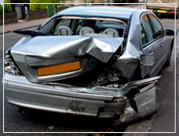   |
 |


Insurance companies and their attorneys are experienced in pointing the finger at somebody else. That somebody else is generally the very person, child or adult which, was injured. This concept is called comparative fault. This means that you, the victim, are partially at fault, and therefore not entitled to 100% compensation for property damage, wages, medical expenses, and injuries.
A driver who is cited at the scene for a traffic infraction can easily avoid the ticket based upon his/her prior driving history or by simply appearing in court and contesting the infraction resulting in a finding of not guilty. The insurance company will then suggest that the injured person was at fault since the negligent driver was found not guilty of the citation, and therefore he/she was not at fault.
Often times, collisions occur in which a loved one is involved. A husband who is driving with his wife and/or children as passengers, or when aunts/uncles are driving a vehicle wherein relatives are passengers, the examples are too numerous to mention. In these instances, the insurance company will use the relationship as leverage to minimize the extent and nature of the injuries to the relatives involved.
For example, a wife is not likely to sue her husband who was negligent when driving. A child is far less likely to sue the parent or uncle or loved one who was driving. Many times, a relative or loved one will not even know if there is coverage available, and the insurance company has no obligation to advise any person of his/her right to sue.
Furthermore, automobile insurance covers many more situations than the average person understands. Your own auto insurance covers you and your family as a pedestrian, or when riding in the vehicle of another person. Your auto insurance may even cover you when riding a bicycle, skateboard, or while rollerblading, as well as your children.
These are all situations in which your insurance carrier may refrain from advising you, unless you ask. Therefore, know what the insurance companies already know. |
 Automobile and pedestrian accidents are the leading cause of serious injuries which traumatically affect both children and adults. Insurance companies are prepared to investigate and handle these claims very quickly. On the other hand, injured children and adults are dealing with pain and medical expenses, and don’t have the time or the resources to properly investigate the collision.
Automobile and pedestrian accidents are the leading cause of serious injuries which traumatically affect both children and adults. Insurance companies are prepared to investigate and handle these claims very quickly. On the other hand, injured children and adults are dealing with pain and medical expenses, and don’t have the time or the resources to properly investigate the collision.